“Farewell My Concubine” is also the name of a traditional tragic Peking opera, where Xiang Yu is facing an inevitable defeat against Liu Bang. Knowing this, Consort Yu performed a sorrowful dance and committed suicide using Xiang Yu’s sword to express her loyalty and love. Devastated by her death, Xiang Yu fought valiantly before taking his own life. Notably, in the old times, traditional Peking opera allows only male actors, even for the female characters.
Duan Xiaolou and Cheng Dieyi grew up together in a Peking opera troupe and became famous actors. They are especially known for their performance of the traditional opera “Farewell My Concubine”, where Dieyi plays the concubine — “Consort Yu” and Xiaolou plays the king — “Xiang Yu”. They promised to perform this play together for the rest of their lives. However, while Xiaolou kept his personal life and his life on stage separate, Dieyi was lost in the role as if he really became “consort yu”. As the movie depicts their story over the most turbulent eras of Chinese history, it becomes more and more difficult for Dieyi to protect their promise, and eventually, he suicide when performing with Xiaolou, just like consort yu in the play.
Throughout the movie, the themes of identity, love, and freedom are constantly brought up. This allows the movie to serve as a appropriate media for the presentation of existentialism concepts of freedom, authenticity, and nihilism.
The movie begins with Dieyi’s mother trying to send Dieyi to the Peking opera troupe, however, they are rejected due to Dieyi’s sixth finger, as it would scare off the audience, according to Master Guan. Meanwhile, in the background noise, there is a man yelling to advertise his service of “sharpening knives”, it seems to already sentence this extra finger to death. In the next scene, the mother chopped off Dieyi’s finger and left him at the troupe, that day, Dieyi lost both his finger and his mother. This childhood trauma of loss and drastic change in life destroys his sense of security. Psychologically, we would expect Dieyi to grow up being more sensitive to instabilities. In other words, it made Dieyi more susceptible to anxiety, which existentialists define to be the result of fear towards powers that destroy our stable and familiar complacent. We would also expect the loss of mother’s love to make Dieyi more desperate for emotional attachments. Therefore, this scene of loss foreshadows to his love towards Xiaolou and his fear of losing him, which are constantly brought up later on in the film.
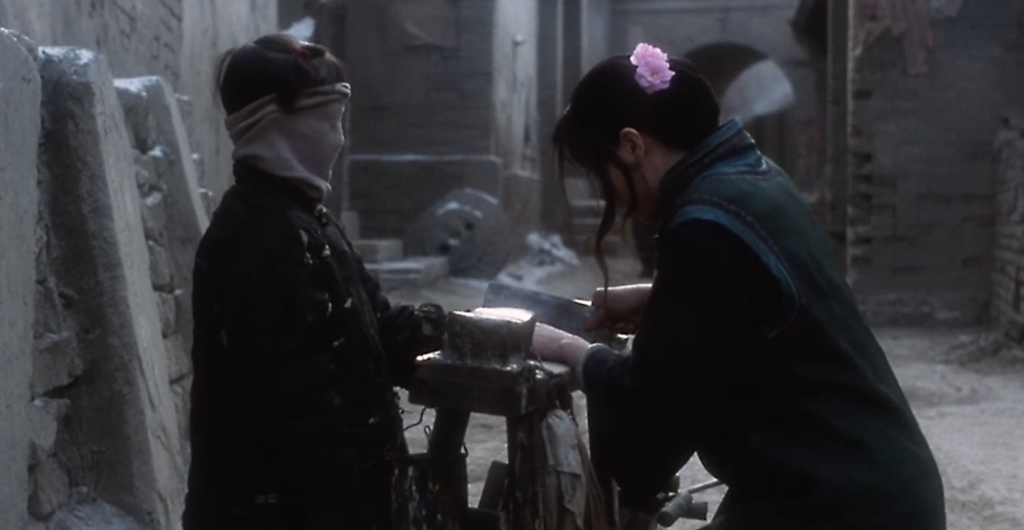
In the Peking opera troupe, Dieyi learned to play dan(“旦”, female characters in Peking opera), while Xiaolou learned to play jing(“净”, male characters in Peking opera). While Dieyi’s appearance is a perfect fit for dan, he always messes up one line in the play “Dreaming of the World Outside the Nunnery”: Instead of saying “I am by nature a girl, not a boy”, he always misspoke as “I am by nature a boy, not a girl”. For this mistake, Dieyi is often punished by palm slapping. This displays a classical conflict between existentialism versus societal expectations. Kierkegaard defines an authentic individual, a major existentialism ideology, as someone who is “willing to be one’s own self”. Namely, the person embraces a life beyond conforming to the society. In this part, Dieyi firmly protects his gender identity against the persecution from his opera teacher and the disapproval from the society of the troupe; this makes him an authentic individual. However, when an agent visits the troupe to order a performance for eunuch Zhang, Dieyi misspoke his line again. Xiaolou then punishes him by sticking a hot smoking pipe into his mouth, when blood flows out from Dieyi’s mouth, he finally speaks the monologue correctly. This action also carries a sexual implication, the smoking pipe and Dieyi’s mouth represent male and female genitals, how Dieyi’s mouth bleeds after the smoking pipe sticks into it symbolises the loss of virginity, as if after this moment Dieyi’s sexual authenticity was taken and he actually became female.
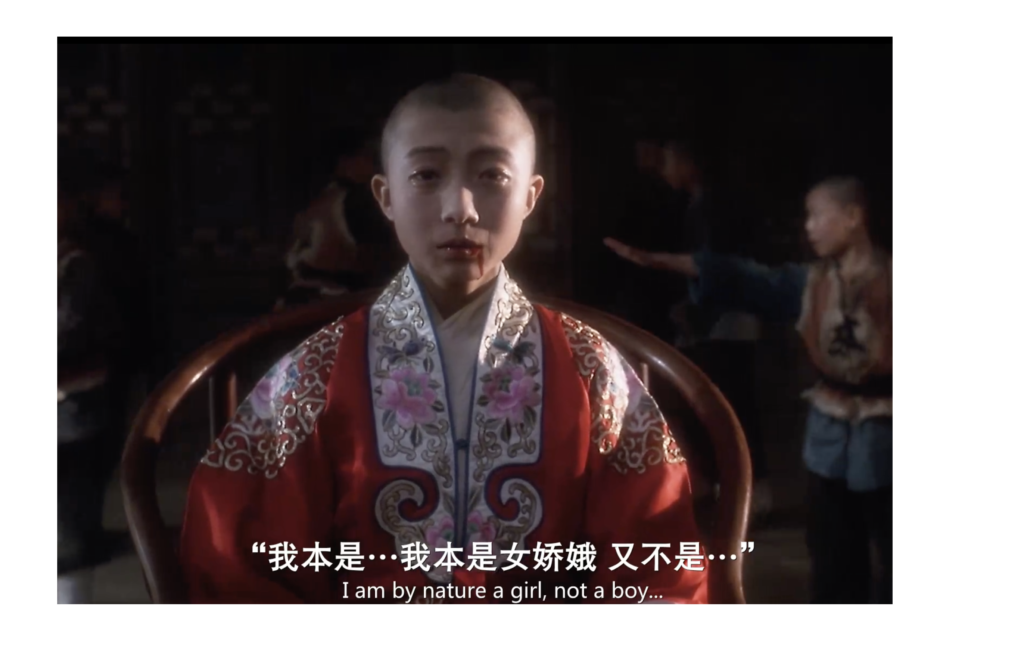
As the actor of Dieyi switches to Leslie Zhang, the movie moves on from Dieyi’s childhood stories to his adulthood.
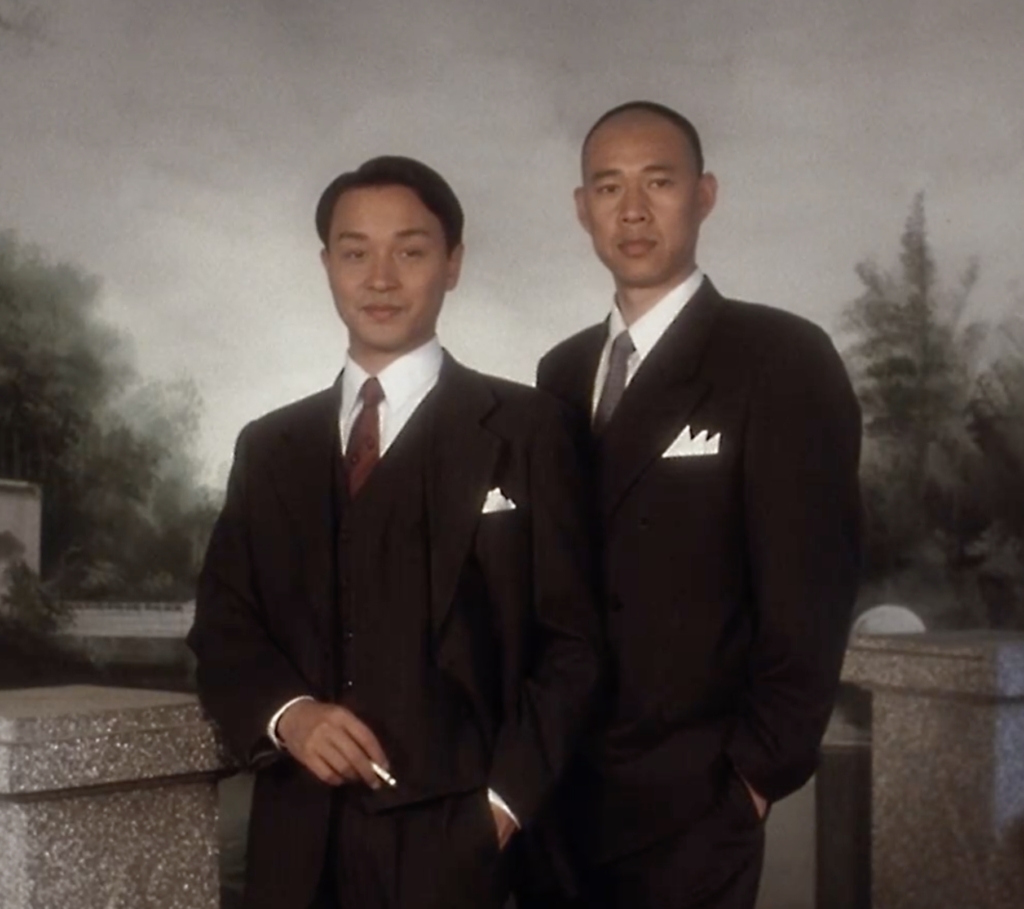
It was already obvious since Dieyi’s childhood that he has a special affection towards Xiaolou. Such affection is amplified by years and years of performing the opera “Farewell My Concubine” together with Xiaolou, that consort yu’s passionate love towards Xiang Yu has influenced Dieyi to love Xiaolou in a similar way. Or it can also be said that it is Dieyi’s genuine love towards Xiaolou that made his performance on stage so realistic, which made him the best performer of Consort Yu. In my opinion, the characterisation of consort Yu and the characterisation of Dieyi himself have an intertwining influence towards each other, that Dieyi and consort Yu in some sense become the same person. However, while Dieyi is leaning to become consort Yu, Xiaolou refuses to be his Xiang Yu offstage. Xiaolou’s clear separation between on-stage and off-stage is demonstrated from several aspects, and it threatens Dieyi’s longing for a familiar relationship with Xiaolou in the troupe, playing consort Yu and Xiang Yu together. Xiaolou started going to the brothel to meet a prostitute he fell in love with — Juxian. There was once when Juxian was being harassed by some customers, and Xiaolou stepped forward to rescue her, even announcing that Juxian was engaged to him. This story quickly reached Dieyi. While putting on makeup with Xiaolou, Dieyi questioned Xiaolou about the incident and then expressed his wishes to Xiaolou. Dieyi told Xiaolou that he wanted to perform with Xiaolou for the rest of his life and that one year, one month, one day, even one second less makes it less than one lifetime. This conversation is Dieyi’s attempt to retain Xiaolou, and it is also obvious that Dieyi’s feeling towards Xiaolou is more than a partner on stage, he sees their relationship as almost lovers. That’s why after knowing what happened between Xiaolou and Juxian, he felt betrayed and thus fears the possibility of Xiaolou failing his commitment towards Dieyi because of Juxian. This fear of an uncertain future and the collapse of the familiar and secure past furthers the sense of anxiety presented in the film. The conflict between Dieyi and Xiaolou is enhanced as Juxian asks Xiaolou to marry her. When Xiaolou asked Dieyi to be his best man at his wedding, Dieyi humiliated them with the reply “I haven’t learnt the opera ‘Gangster King and his whore'”. We then see Juxian softly pulling Xiaolou’s arm, subsequently, Xiaolou starts walking away with Juxian. Dieyi tried to retain Xiaolou, however, Xiaolou rejected Dieyi with the line “I’m just a fake king(Xiang Yu), really are concubine Yu”, and left with Juxian. What Dieyi used to fear became the reality: Xiaolou chose Juxian over him.

The movie then takes the audience through two significant events in Chinese history — The Second Sino-Japanese War and the Chinese Civil War. As the victim of the Second Sino-Japanese War, the relationship between China and Japan was extremely hostile. This is presented in the conflict between Xiaolou and the Japanese soldier.
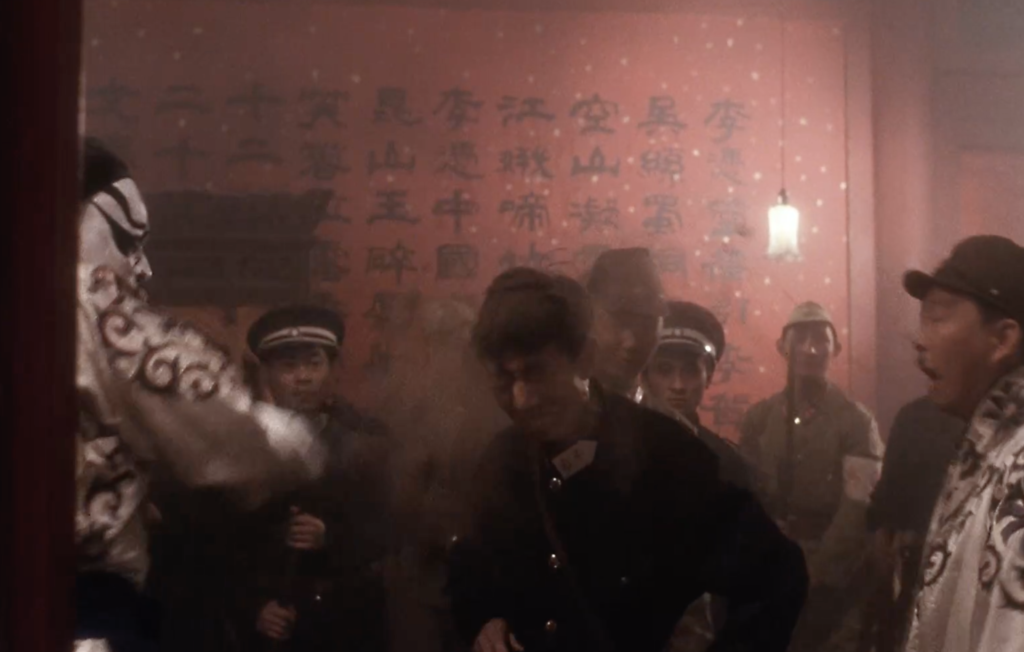
In this scene, the Japanese soldier and his translator are teasing Xiaolou, and what the translator gets in return is a smack on the head with a teapot. The Chinese society’s resistance towards the Japanese army extends to the formation of a social morality, any collaboration with the Japanese army would be refuted. This is reflected when Dieyi compromises to perform for the Japanese people such that he could save Xiaolou, Xiaolou despises Dieyi and spits on him.
This social morality then furthered to legal punishments, Dieyi was later put on trial after China won the war because he performed for the Japanese army. (Although he was eventually released, as a commander of the Chinese Nationalist government also enjoyed his opera…) Yet, regardless of such heavy social resistance, Dieyi never gave up on his pursuit of opera. The existentialist philosopher Kierkegaard once described a knight of faith, it is an authentic individual who is “willing to be one’s own self”. This individual would also value the act of being authentic over being morally correct. In this sense, Dieyi would be a knight of faith, as he continued to pursue opera even with the Japanese, which was considered severely morally incorrect under the social circumstances of China at that time. This is shown when Dieyi manages to stay focused on his performance when scandals between Japanese soldiers and Chinese audiences are happening on the stage. Furthermore, when Dieyi was on trial in court, his colleagues attempted to save him by lying that he was performing for the Japanese army because he was tortured by them. However, Dieyi decided to be authentic and honest. He rejected the false testimony and admitted that he genuinely believed “If Aoki(the Japanese commander who enjoyed his performance) was alive, he’d have taken Peking opera to Japan.”
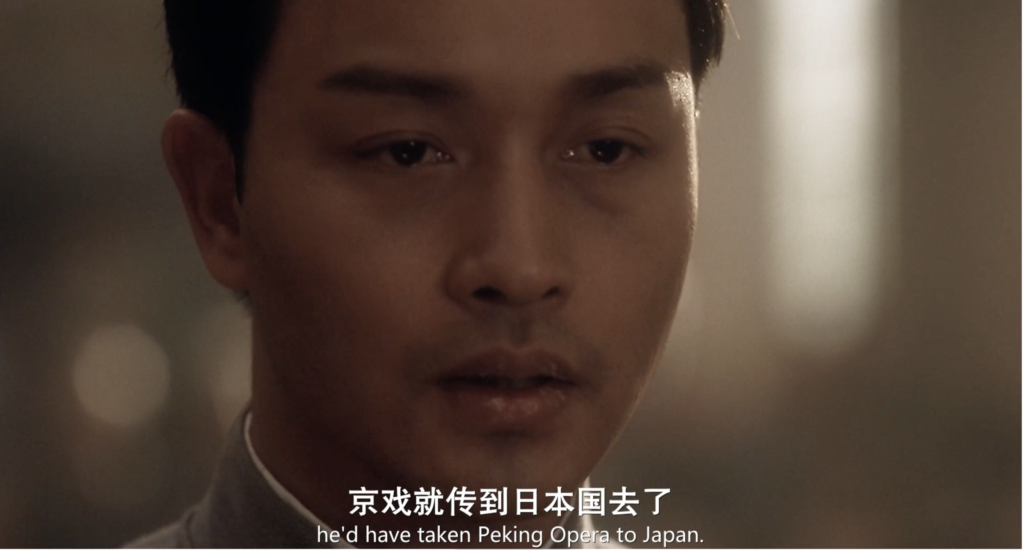
Later on, after the Chinese Civil War, the Chinese community party took control of the country. The new government began promoting “modern opera”. In the movie, this form of art wasn’t introduced in detail. But historically, modern opera aligns with the ideology of the communist revolution, rejecting traditional romanticism and revising many classical operas such that it obeys “historical materialism”. In essence, the plays are created to convey the messages of proletarian dictatorship and democratic revolution. Accordingly, they used plain and casual costumes. During that turbulent and impulsive era, people coming up with any ideas that seem to contradict the dominant ideology would be denunciated. Therefore, Dieyi’s colleagues all compromised and supported everything about this new form of art. However, Dieyi still argued that “the costumes aren’t very attractive, the backdrops are also too realistic, nothing pleasures the eye”. Expectedly, Dieyi’s suggestions towards the props were distorted by others as “opera can only be about ancient beauties and heroes but not the modern working class”. Along with his previous record of performing for the Japanese, Dieyi was eventually denunciated.
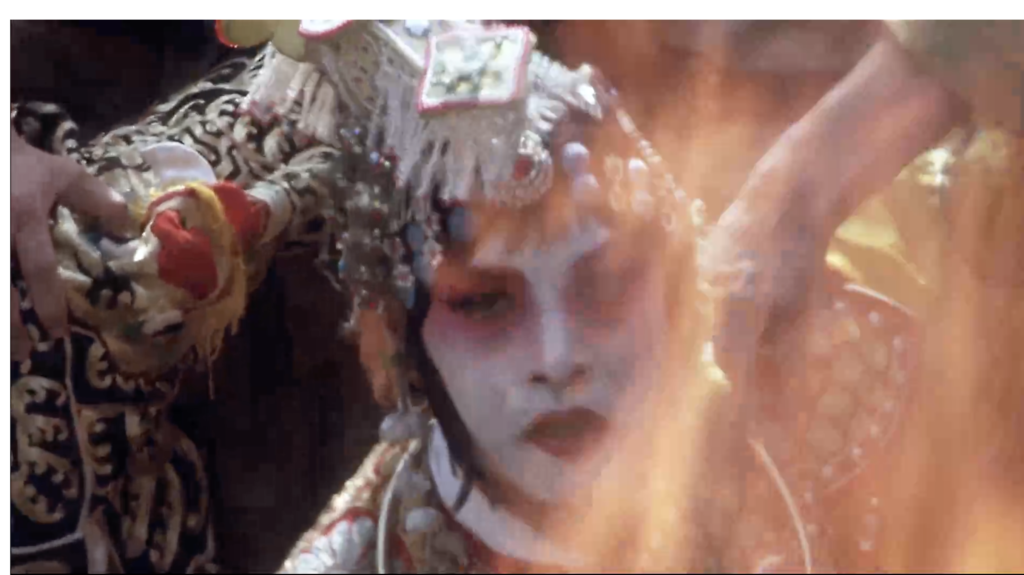
In the next scene, 11 years have passed, but Dieyi was finally able to perform “Farewell My Concubine” again with Xiaolou. There was no audience, just the two of them, as if they were really the concubine Yu and Xiang Yu. As the performance reaches the part where concubine Yu suicide. Dieyi takes the sword away from Xiaolou and cuts his own throat. At this moment, he really becomes the concubine Yu, and he also fulfils his commitment to performing with Xiaolou for the rest of his life.
